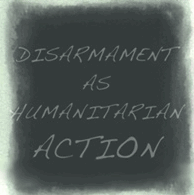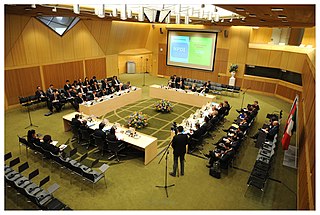
The Treaty on the Non-Proliferation of Nuclear Weapons, commonly known as the Non-Proliferation Treaty or NPT, is an international treaty whose objective is to prevent the spread of nuclear weapons and weapons technology, to promote cooperation in the peaceful uses of nuclear energy, and to further the goal of achieving nuclear disarmament and general and complete disarmament. Between 1965 and 1968, the treaty was negotiated by the Eighteen Nation Committee on Disarmament, a United Nations-sponsored organization based in Geneva, Switzerland.

A weapon of mass destruction (WMD) is a nuclear, radiological, chemical, biological, or any other weapon that can kill and bring significant harm to numerous humans or cause great damage to human-made structures, natural structures, or the biosphere. The scope and usage of the term has evolved and been disputed, often signifying more politically than technically. Originally coined in reference to aerial bombing with chemical explosives during World War II, it has later come to refer to large-scale weaponry of other technologies, such as chemical, biological, radiological, or nuclear warfare.

Disarmament is the act of reducing, limiting, or abolishing weapons. Disarmament generally refers to a country's military or specific type of weaponry. Disarmament is often taken to mean total elimination of weapons of mass destruction, such as nuclear arms. General and Complete Disarmament was defined by the United Nations General Assembly as the elimination of all WMD, coupled with the “balanced reduction of armed forces and conventional armaments, based on the principle of undiminished security of the parties with a view to promoting or enhancing stability at a lower military level, taking into account the need of all States to protect their security.”

Jody Williams is an American political activist known for her work in banning anti-personnel landmines, her defense of human rights, and her efforts to promote new understandings of security in today's world. She was awarded the Nobel Peace Prize in 1997 for her work toward the banning and clearing of anti-personnel mines.

The Initiative for Peace and Human Rights was the oldest opposition group in East Germany. It was founded on 24 January 1986 and was independent of the churches and state. On 7 February 1990 it joined with New Forum and Democracy Now to form the electoral Alliance 90 and merged with them to form the Alliance 90 party on 21 September 1991.

The Conference on Disarmament (CD) is a multilateral disarmament forum established by the international community to negotiate arms control and disarmament agreements based at the Palais des Nations in Geneva. The Conference meets annually in three separate sessions in Geneva.
The New Agenda Coalition (NAC), composed of Brazil, Egypt, Ireland, Mexico, New Zealand and South Africa, is a geographically dispersed group of middle power countries seeking to build an international consensus to make progress on nuclear disarmament, as legally called for in the nuclear NPT.
Quaker Peace & Social Witness (QPSW), previously known as the Friends Service Council, and then as Quaker Peace and Service, is one of the central committees of Britain Yearly Meeting of the Religious Society of Friends - the national organisation of Quakers in Britain. It works to promote British Quakers' testimonies of equality, justice, peace, simplicity and truth. It works alongside both small local and large international pressure groups.

The United Nations Institute for Disarmament Research (UNIDIR) was established in 1980 by the United Nations General Assembly to inform States and the global community on questions of international security, and to assist with disarmament efforts so as to facilitate progress toward greater security and economic and social development for all.
The Acronym Institute for Disarmament Diplomacy was founded in 1995 by Rebecca Johnson, senior advisor to the United Nations' United Nations Monitoring, Verification and Inspection Commission chaired by Hans Blix from January 2000 to June 2003. It states as its goal "to promote effective approaches to international security, disarmament and arms control. Engaging with governments and civil society, Acronym provides reporting, analysis and strategic thinking on a range of issues relevant to peace and security, with special emphasis on treaties and multilateral initiatives."

The Ministry of External Affairs of India is the government agency responsible for maintaining the foreign relations of India. The Ministry of External Affairs is headed by the Minister of External Affairs, a Cabinet Minister. The Foreign Secretary, an Indian Foreign Service officer, is the most senior civil servant who is the head of the Department of Foreign Affairs. The Ministry represents the Government of India through embassies and is also responsible for India's representation at the United Nations and other international organizations. It also advises other Ministries and State Governments on foreign governments and institutions.

The International Campaign to Abolish Nuclear Weapons is a global civil society coalition working to promote adherence to and full implementation of the Treaty on the Prohibition of Nuclear Weapons. The campaign helped bring about this treaty. ICAN was launched in 2007 and counts 607 partner organizations in 106 countries as of 2021.

Disarmament as Humanitarian Action: Making Multilateral Negotiations Work (DHA) is a research project carried out at the United Nations Institute for Disarmament Research (UNIDIR). This project, launched in 2004, examines current difficulties for the international community in tackling disarmament and arms control challenges.
The Middle Powers Initiative (MPI), a program of the Global Security Institute, is dedicated to the worldwide reduction and elimination of nuclear weapons, in a series of well-defined stages accompanied by increasing verification and control.
Anti-nuclear organizations may oppose uranium mining, nuclear power, and/or nuclear weapons. Anti-nuclear groups have undertaken public protests and acts of civil disobedience which have included occupations of nuclear plant sites. Some of the most influential groups in the anti-nuclear movement have had members who were elite scientists, including several Nobel Laureates and many nuclear physicists.

The UN Office for Disarmament Affairs (UNODA) is an Office of the United Nations Secretariat established in January 1998 as the Department for Disarmament Affairs, part of United Nations Secretary-General Kofi Annan's plan to reform the UN as presented in his report to the General Assembly in July 1997.
The 13 steps are identified in a paragraph of the Final Document of the 2000 Review Conference of the Nuclear Non-Proliferation Treaty, providing a set of 'practical steps for the systematic and progressive efforts to implement Article VI of the Treaty on the Non-Proliferation of Nuclear Weapons'. Article VI is the part of the Treaty that provides for disarmament, including nuclear disarmament.

The Non-Proliferation and Disarmament Initiative (NPDI) is a coalition of states within the framework of the Nuclear Non-Proliferation Treaty (NPT) formed in 2010.

Established in 2008 by Nathan Taback, Christina Willie and Robin Coupland, Insecurity Insight is a Geneva-based non-profit organisation that has developed the ”Taback-Coupland model of armed violence”, a model that is used to generate data on the impact of armed violence and insecurity on people's lives and wellbeing with a view to generating preventive policies.
The Prevention of an Arms Race in Outer Space document is a 1981 UN resolution that reaffirms the fundamental principles of the 1967 Outer Space Treaty and advocates for a ban on the weaponization of space."












